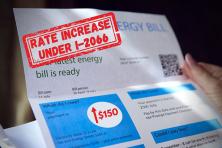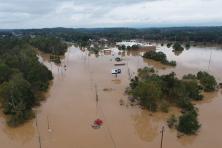Pandemic shines more light on environmental injustice
According to a new study from the Harvard School of Public Health, people who contract COVID-19 are more likely to die from the disease if they live in areas with high levels of air pollution than those who breathe cleaner air. The new research, which examines coronavirus cases across the US, underscores the need to enforce existing air pollution regulations to protect human health; it also serves as a powerful, additional condemnation of Trump administration efforts to roll back life- and climate-protecting clean-air regulations.
Communities of color are disproportionately exposed to air pollution. Now, many communities of color—especially black communities—are turning out to be highly vulnerable to the coronavirus pandemic, with disproportionate numbers of infections and deaths among African Americans in both rural and urban areas across the country. Exposure to pollution is one of many factors that negatively impact public health among communities of color, resulting from decades of unequitable policy decisions. This underscores yet again why addressing environmental and climate justice is so important.
Fossil Fuel Industry’s Ambulance Chasing
This week, seventeen Republican senators called on the Federal Reserve to “be flexible” with distributing bailout funds—specifically intending “to ensure that fossil fuel companies aren’t excluded.” In a tweet, journalist David Roberts noted that these are some of the same lawmakers “who dismissed it as absurd that any relief money should go to clean energy industries.”
While fossil fuel interests were unsuccessful in getting Congress to include a dedicated oil industry bailout among federal coronavirus relief measures, the Trump administration is moving at full speed enacting policies that will benefit big oil at the expense of our climate and public health. Foremost among these is the gutting of fuel economy standards, but the administration appears to be giving industry insiders privileged access to other policy debates as well, including a critical rewrite of environmental permitting rules.
Responding to the climate crisis during the COVID one
The list of important events cancelled or postponed due to the pandemic has grown to include the next international climate conference, which the U.N. had scheduled to take place this fall in Glasgow. COP-26 will now be postponed until 2021; organizers hope that when the summit does take place, it can be an important forum for ensuring that COVID recovery funds benefit an international clean energy transition.
In her assessment of what the coronavirus means for climate change, Meehan Crist notes that “our response to this health crisis will shape the climate crisis for decades to come. The efforts to revive economic activity—the stimulus plans, bailouts and back-to-work programs being developed now—will help determine the shape of our economies and our lives for the foreseeable future, and they will have effects on carbon emissions that reverberate across the planet for thousands of years.”
There are positive indications: despite the recent precipitous drop in oil and gas prices—and despite the industry’s stubborn influence over US government policy—fossil fuel use does not appear to be gaining ground against other, cleaner sources of energy. Renewable energy sources like wind and solar are gaining in importance in the US; in fact renewables are set to account for nearly 21 percent of nationwide electricity use this year—a record.
One thing you can do
Times like these remind us that local news and independent investigative journalism are never more important than in a crisis to get real-time, local information to help our communities and stay informed.
It’s important to hold media accountable for the breadth and depth of their reporting on the climate crisis, which the Columbia Journalism Review rightly calls the story of our time.
It’s also important that we recognize and reward the value of good journalism. The COVID pandemic is threatening the health of our body politic in many ways, one of which is its devastating impact on newsrooms and the financial underpinnings of local media outlets. Please consider supporting good, independent journalism with your subscriptions and contributions.





